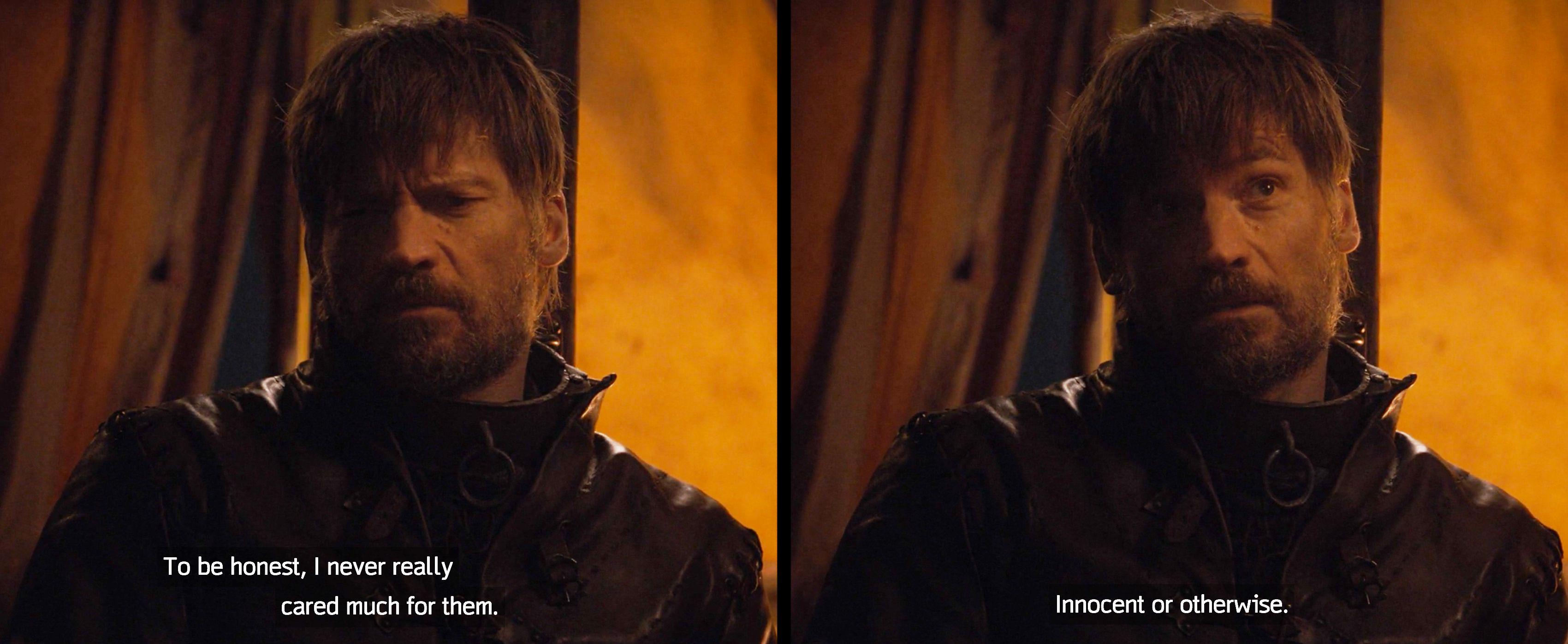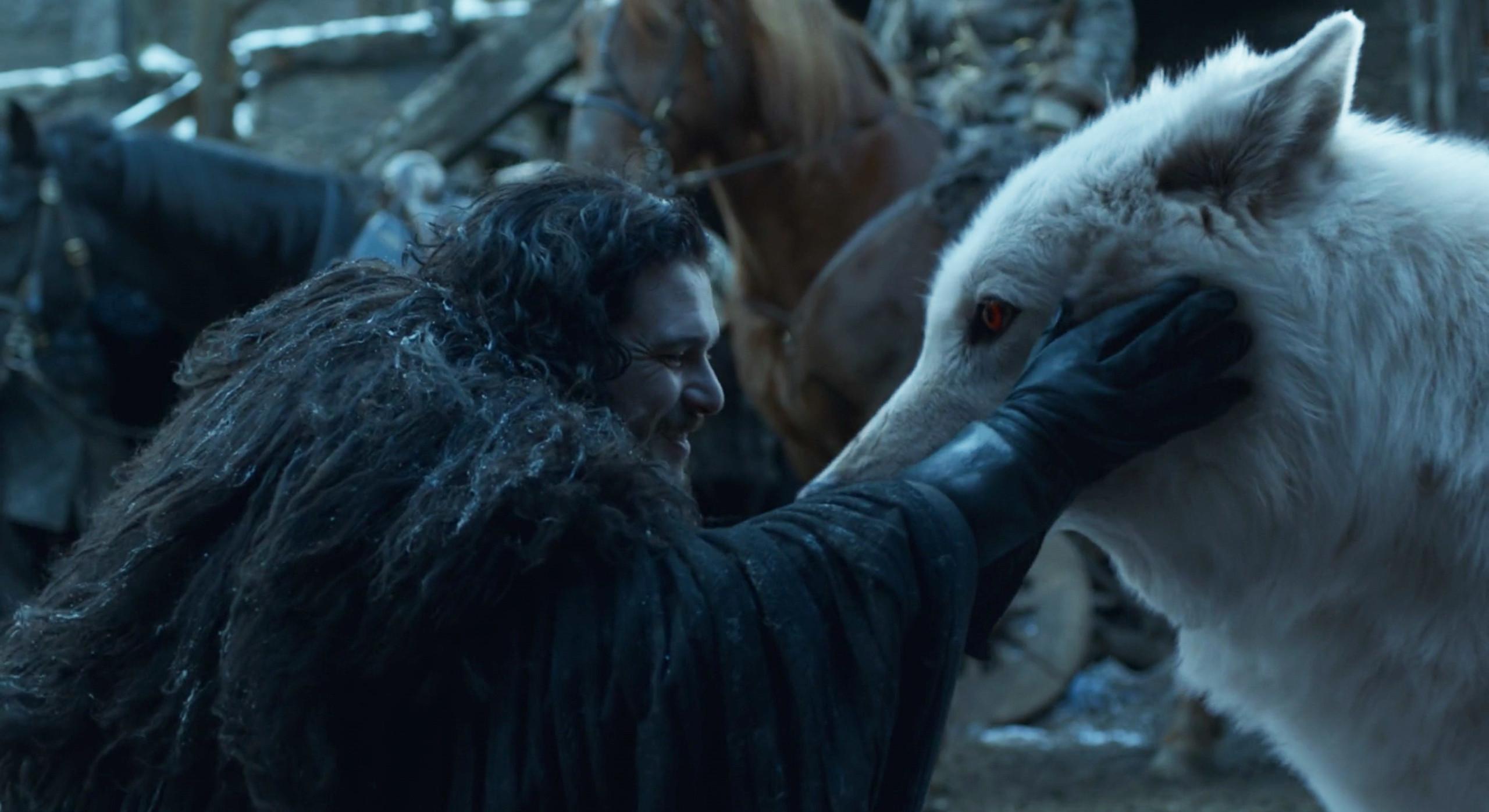Stannis Baratheon once said, “A good act does not wash out the bad, nor a bad the good.” The same is true of storytelling: A disappointing conclusion or sequel can’t retroactively ruin strong material, nor can satisfying conclusions erase previous flaws. The Godfather Part III doesn’t make the first two Godfather entries anything less than masterpieces, while conversely, no number of jokes in Avengers: Endgame can make Thor: The Dark World watchable. The same holds true for Game of Thrones. No matter what your feelings are toward the widely panned seventh and eighth seasons, the first six seasons of this saga will stand as incredible television; an unrivaled cultural phenomenon.
But new material can recontextualize prior work. When mishandled, subsequent storytelling can complicate previous scenes, removing tension or creating plot holes. With that idea in mind, let’s look at some earlier moments that introduced plot points that fizzled out or examined themes that were later undermined by developments in the final two seasons. (We’ll examine the scenes that got better as a result of the conclusion on Wednesday.) Here are seven iconic scenes that, upon a rewatch of the show, will leave you scratching your head or feeling underwhelmed compared with the first go-around:
The Hardhome Massacre (Season 5, Episode 8)
Hardhome still has a compelling case for the best battle of the series, but it loses a bit of impact now that the Long Night essentially became the One-Night Stand. When the Night King raised his arms and stared at Jon and the music cut to an eerie silence, it seemed like the show was delivering a message: This is the threat that actually matters in Westeros. For years, the game of thrones felt like a distraction from the impending apocalypse gathering beyond the Wall, and this episode crystallized that in a way nothing else had.
Yet any big White Walker scene—including when the Night King kills Viserion or topples the Wall—can’t elicit the same kind of dread after the final season. Season 8 dispensed with the White Walkers in Episode 3, pivoting back to the palace intrigue and making Cersei the Big Bad after Arya killed the Night King with one quick poke from her dagger. The spectacle of Hardhome still matches anything the show has produced, but the overall importance of it has been neutered by the White Walkers’ quick demise after heading South of the Wall.
Jaime and Brienne in the Bath (Season 3, Episode 5)
Almost every single Jaime-Brienne scene carries less impact now that we know Jaime leaves Brienne a blubbering mess in the Winterfell yard just so he can ride south to see Cersei and get killed under some bricks. That includes when Jaime jumps into a bear pit for Brienne, when he gives her his Valyrian steel sword, when she pleads with him to come North and fight for the living, when she vouches for him in the North, and when he knights her.
This scene is the peak of their shared arc, and thus suffers the most from the ultimate conclusion. Not only does the Harrenhal bath reveal develop the relationship between Brienne and Jaime, but it also lays out the Kingslayer’s backstory. Finally, we learn that Jaime didn’t kill King Aerys because his father was coming or because he lacks honor, but precisely because he cares about the innocent. He’s not truly the monster the story had presented him as for more than two seasons—he’s a misunderstood knight who acts monstrously because people will assume the worst in him anyway. While no scene could ever wash away his sins, Jaime is a beautifully complex character; Thrones at its absolute peak. It ends with a poetically simple line that sums up everything about a character who has always been known for his acts and his reputation, not his heart: “Jaime, my name is Jaime.”
Here’s where the show took that character in its final season:

Jaime’s running back to Cersei could work from a storytelling perspective: Perhaps Jaime feels like he doesn’t deserve Brienne’s love or a happy ending and goes back out of a sense of self-loathing. That’s a powerful idea, but the show didn’t present it that way. The final two episodes paint a picture of Jaime leaving simply because, while he felt compelled to join humanity against the army of the dead, his true loyalties beyond that were always to Cersei and the Lannisters, everyone else be damned. Perhaps Jaime really always deserved the Kingslayer moniker that was so frequently hurled at him like an epithet. But if that’s true, it makes scenes like the one Jaime and Brienne share in the baths ring hollow.
Hodor Holds the Door (Season 6, Episode 5)
Why did Hodor hold the door? Was it so Bran could be bait for the Night King in the godswood? So Bran could become king? Neither of those possibilities is satisfying, as there are still more questions than answers as to why the Bran-as-bait plan even worked, as well as concerns about whether Bran will be what Westeros really needs in a leader.
At the time, Hodor’s involuntary sacrifice seemed like it would serve as more than a plot device to help Bran get out of the Three-Eyed Raven’s cave. Jojen Reed once told Bran that he was “the only one thing that matters,” and this moment echoed that sentiment. At the time it seemed like Bran was on a Chosen One–style arc that would mirror Jon’s and maybe Daenerys’s as well, and that he would be absolutely crucial to stopping the White Walkers and saving the Seven Kingdoms. His place in the Battle of Winterfell technically means he fulfilled that role, but it seemed more like the show ticking boxes than anything else. Back in Season 6, it seemed like Bran would do something to defeat the Night King, that he would harness his Three-Eyed Raven powers that doomed Hodor and learn how to use them for good. Instead, he passively sat in Winterfell’s godswood and waited patiently for Arya to strike. It’s rather underwhelming.
Bran may have ended up ruling over the Seven Kingdoms, but in the final couple of seasons his character arc was as flat as the tone of his voice. That makes the big moments that got him to this point—including the deaths of Jojen, Summer, and the Children of the Forest, plus Meera Reed’s sacrifices—seem unearned in retrospect. None of those moments was bigger than Hodor’s, and he never had a choice to sacrifice himself for Bran. It makes you wonder if there was ever more planned for this moment’s upshot.
Jon’s Parentage Is Confirmed (Season 6, Episode 10)
This moment was supposed to change everything, yet in the end it became little more than a plot device that helped turned Daenerys into the Mad Queen. Jon’s taking his Targaryen heritage and claiming the throne wouldn’t have felt true to the themes of the story, but the truth should have at least made more of an impact on him. After his first chat with Sam, Jon never fully grapples with his heritage on screen—does he feel conflicted about not being Ned Stark’s son? Is he angry at Ned for lying to him? Does he feel like more of a Stark than ever, or less of one? Does he regret joining the Night’s Watch? Jon’s status as a bastard informed his entire life; learning that it was all a lie should have caused him to question everything. But instead, the show focused on Jon’s suppressing those emotions to appease Dany.
In Season 8, Bran made it sound so important that he and Sam tell Jon about Rhaegar and Lyanna—was the purpose of that just to drive a wedge between Jon and Daenerys? That’s essentially the only thing Jon’s true parentage accomplished.
This scene also includes the previously revealed moment when Ned turns around before heading into the Tower, seemingly having heard Bran through time. This is five episodes after Hodor’s death—why include it a second time if time travel would never make a reappearance in the show? This scene seemed to set the stage for Bran to do some further meddling with time, but that never happened.
The Stark Children Find the Direwolves (Season 1, Episode 1)
“They were meant to have them,” says Jon, pleading with Ned to let the Stark children keep the direwolves. Indeed, the appearance of the direwolf pups seems cosmic: The first direwolf seen south of the Wall in centuries leaves one pup for each of the Stark children, plus an albino runt for Jon Snow. The direwolf is the sigil of House Stark; it’s so symbolic, how can the children not be meant to have them?
The pups bring us into the consequences of Thrones’ universe early. Ned is compelled to kill Lady, Sansa’s pup, in the second episode of the series despite Lady never doing anything wrong. Arya has to chase Nymeria away and reunites with her for only one brief moment in Season 7. Summer, Shaggy Dog, and Grey Wind all perish throughout the series. Only Ghost appears at the end of the story, and Jon finally pets him in the series finale:

Jon’s rejoining Ghost is a vivid symbol of how he’s come to embrace his Stark heritage and the North—the real North, as Tormund says—in the end. But it doesn’t carry quite as much emotional impact as it could have after Ghost was missing for all of Season 7 and nearly all of seasons 6 and 8.
In the books, the Stark children share a potent connection with their wolves, and all six are implied to be wargs (even if not all of them realize their abilities). The wolves are crucial to their characters; in the show, they’re sidelined. That will always dampen the impact of Jon’s final reunion with Ghost, and this scene—part of the first chapter of A Game of Thrones that George R.R. Martin said came “out of nowhere” for him when he first conceived of A Song of Ice and Fire, by the way—will always stand as a reminder of how the show mishandled the direwolves.
Littlefinger’s “Chaos Is a Ladder” Speech (Season 3, Episode 6)
There was a time when it seemed like the game of thrones was a chess match between Littlefinger and Varys. Baelish had essentially engineered the War of the Five Kings, while Varys had helped broker the Daenerys–Khal Drogo marriage and was plotting to put a new Targaryen on the throne. As a result, the scenes in which Varys and Littlefinger appear together—which don’t exist in the books because neither is a point-of-view character—crackle with tension and subtext.
Both of these master schemers lost their cunning in later seasons. Littlefinger died begging for mercy after his bizarre plot to turn Arya and Sansa against each other failed. Varys, the former Master of Whisperers, was caught shouting about treason to anyone within earshot. The scenes when these two were at their best—when they were each three moves ahead of everyone except for each other—still pop, but they also shine a light on how the later seasons of Thrones couldn’t figure out what to do with its schemers. One of the hardest things for a writer to do is craft a character smarter than themselves, and Varys and Littlefinger suffered immensely when George R.R. Martin’s source material ran dry.
Jon’s Resurrection (Season 6, Episode 2)
Like Jon’s parentage, his resurrection was supposed to change everything. And then … it was rarely brought up in any consequential capacity after Season 6. At times it’s not clear who is even aware that he’s been resurrected—Daenerys didn’t know in Season 7, but doesn’t react in Season 8 when Tormund blurts it out loud at the feast after the Battle of Winterfell. Tyrion brings it up casually in the finale.
Jon was brought back by the Lord of Light for a purpose. Perhaps that purpose was to unite humanity against the Night King. Perhaps it was to save the realm from Daenerys. In either case, he fulfilled that, but his resurrection had no lasting impact on its own. Jon’s resurrection should have carried vast implications, both for the realm as a whole and especially for his own character, but the show never explored that ripple effect. Sometimes in seasons 7 and 8, you can forget that Jon ever died at all.
Disclosure: HBO is an initial investor in The Ringer.
